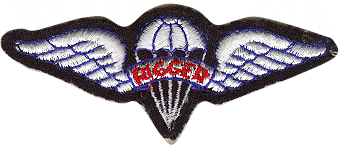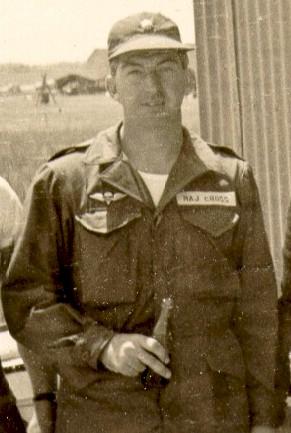
On 9 June 1986, the Chief of Staff of the Army approved adoption of the parachute rigger badge as a permanent special skill badge. The parachute rigger badge is the only special skill badge approved for a Quartermaster specific Military Occupation Specialty (MOS). This was a timely achievement that coincided closely with the official activation ceremony of the Quartermaster Corps Regiment four days later on 13 June 1986.

History of the Parachute Rigger Badge
The first parachute rigger badge was designed in 1948 by Major Thomas R. Cross and drawn by Sergeant First Class

Ewing of the 11th Parachute Maintenance Company, 11th Airborne Division at Camp Schimmelpfenning, Sendai, Japan. Cross was the division parachute maintenance officer and Ewing worked in the parachute maintenance section. The first design effort consisted of a cloth badge, to be worn on the right sleeve of the field jacket, which depicted a full parachute canopy with a half wing extending from the right side. This design looked very similar to the pathfinder badge so Major Cross suspended design efforts until the 11th Airborne Division moved from Japan to Camp Campbell, KY in 1949. At Campbell they designed another full color cloth badge (shown above is the original badge from the collection of the Quartermaster Museum). This badge was designed to be worn on the field jacket and on the red baseball cap which was adopted by the 11th Parachute Maintenance Company in late 1949. The badge was first displayed during Exercise Swarmer at Camp Mackall, NC in April 1950.
Major (later Colonel) Cross stated, “The purpose of the rigger wings was to promote esprit de corps among the members of the 11th Parachute Maintenance Company and the red cap was used to identify rigger personnel at critical locations such as loading areas and drop zones.” The badge and red cap quickly gained popularity and spread to riggers in other airborne units.
Prior to the official adoption of the badge, it had been worn under the MACOM commander’s authority to authorize the wear of locally designed badges on the utility uniform.

Official adoption of the badge had been sought for many years by a variety of Quartermaster officials. Final adoption was based on a formal request submitted by Mr. James S. Emery, Military Analyst, Airborne Department, Quartermaster School in 1983. This request received unprecedented support from the field, unfortunately it was disapproved at the time. In 1986, General Richard H. Thompson, commander of the U.S. Army Materiel Command and the senior Quartermaster officer in the Army wrote the Chief of Staff of the Army asking him to reconsider the 1983 decision. After requesting some field comments, General Wickham approved the parachute riggers badge on 9 June 1986.
